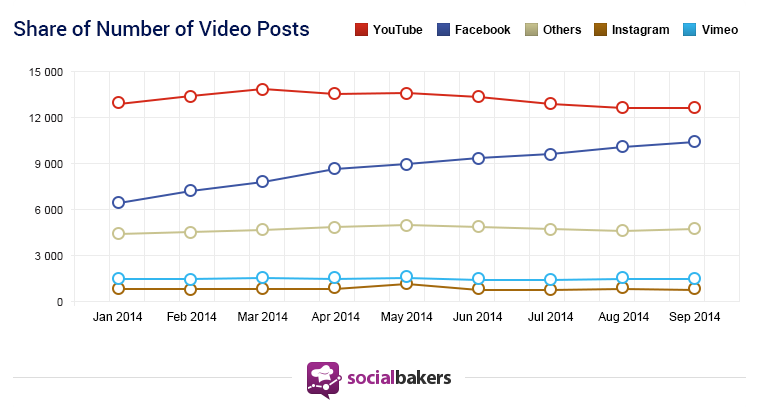If you’re a digital marketer then no doubt you’ll have heard this week about how ‘Facebook is the new YouTube’ or at least something similar. It’s the hot topic at the moment thanks to a recent Social Bakers report showing that since the beginning of the year Facebook has been gradually closing the gap on YouTube and could soon usurp the long standing king of online videos.
Whilst I’m a little annoyed with myself at being drawn into a debate that has, in all likelihood, been cleverly manufactured by Social Bakers with their superbly hyperbolic title ‘Content Creators Flee From YouTube, Flock to Facebook for Videos’ I thought I’d offer my opinion nonetheless…
What’s all the fuss about?
Well, that Social Bakers article (which you may find here).
The article summarises a recent study they carried out of 180,000 Facebook video posts across 20,000 Facebook pages. As you can see from the graph below, there is undeniably a trend showing Facebook coming ever closer to YouTube’s share of video posts on the platform - or to quote the article:
“The recent trend is clearly showing that content marketers are directly uploading video content to Facebook, meaning that Facebook is retaining the traffic at the expense of YouTube”

What does this mean?
According to the article:
“As Facebook has consistently outperformed YouTube in terms of driving views and engagement, content marketers have reacted and have switched to natively published Facebook videos. The subsequent result: YouTube is steadily losing a key distribution platform as content marketers are shifting to Facebook.”
What does this really mean?
Not a whole lot - or at least nothing like the seemingly apocalyptic stance of the title. First and foremost the report looks at “180,000 video posts on Facebook”, it’s not an analysis of the Internet as a whole, just those posting videos on Facebook. No need for digital marketers to start panicking about the death of YouTube and time they’ve wasted successfully building a subscriber base. Therefore, if we were to take a less sensational (and slightly sarcastic) approach to the title of the report it could easily be ‘Brands on Facebook actually start uploading videos to Facebook’.
Furthermore, the report focuses strongly on views. Why is that an issue? Because Facebook has auto-play.
This means that any video that is uploaded directly to Facebook will automatically begin playing when it is the focus of the user’s screen. Alternatively, users are only able to view videos on YouTube by actually clicking on them meaning that engagement levels on Facebook are inevitably going to be much, much higher. It therefore raises the question as to the actual value of video engagement on Facebook. If videos are automatically playing without the explicit consent (i.e. the user clicking play) then are these views as valuable as the ‘opt-in’ YouTube views that reflect genuine interest? Probably not.
Another issue for me is that the report seems to imply that the shift towards native Facebook videos by content marketers has been out-of-the-blue and without influence. Or, at least, it fails to suggest any reason why this might be the case.
Why this shift then?
Facebook has openly and consistently made huge strides towards improving the entire video experience for users and marketers alike. In September last year, auto-play was introduced. In December, they announced they would begin testing video adverts. In June that they would start to improve the News Feed algorithm to better rank videos uploaded directly to Facebook and more recently the testing of the ‘Related Videos’ feature.
All of this and the amount of media coverage it received has without doubt highlighted to marketers that Facebook is now a platform that is worth considering when previously there was no apparent advantage to uploading videos directly to Facebook over linking to them from YouTube. Therefore, the trend that has been spotted by Social Bakers is more a case of Facebook finally providing the tools to help marketers get the best out of video on their platform than a sudden exodus from YouTube.
What can we conclude?
1. YouTube is alive and well.
2. Facebook want to make video posts native & are successfully doing so.
3. Sensationalist titles still spark plenty of debate.
Stay Updated with Our Latest Insights
Get expert HubSpot tips and integration strategies delivered to your inbox.


.jpg)
